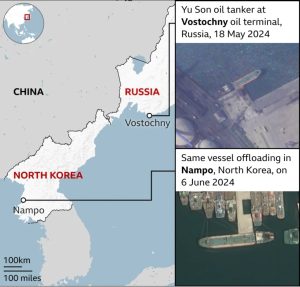Russia Delivers Million Barrels Of Oil To North Korea
Russia is estimated to have supplied North Korea with more than a million barrels of oil since March this year, according to satellite imagery analysis from the Open Source Centre, a non-profit research group based in the UK.
The oil is payment for the weapons and troops Pyongyang has sent Moscow to fuel its war in Ukraine, leading experts and UK Foreign Secretary, David Lammy, have told the BBC.
These transfers violate UN sanctions, which ban countries from selling oil to North Korea, except in small quantities, in an attempt to stifle its economy to prevent it from further developing nuclear weapons.
The satellite images, shared exclusively with the BBC, show more than a dozen different North Korean oil tankers arriving at an oil terminal in Russia’s Far East a total of 43 times over the past eight months.

Further pictures, taken of the ships at sea, appear to show the tankers arriving empty, and leaving almost full.
North Korea is the only country in the world not allowed to buy oil on the open market. The number of barrels of refined petroleum it can receive is capped by the United Nations at 500,000 annually, well below the amount it needs.
Russia’s foreign ministry did not respond to our request for comment.
The first oil transfer documented by the Open Source Centre in a new report, was on 7 March 2024, seven months after it first emerged Pyongyang was sending Moscow weapons.
The shipments have continued as thousands of North Korean troops are reported to have been sent to Russia to fight, with the last one recorded on 5 November.
“While Kim Jong Un is providing Vladimir Putin with a lifeline to continue his war, Russia is quietly providing North Korea with a lifeline of its own,” says Joe Byrne from the Open Source Centre.
“This steady flow of oil gives North Korea a level of stability it hasn’t had since these sanctions were introduced.”
Four former members of a UN panel responsible for tracking the sanctions on North Korea have told the BBC the transfers are a consequence of increasing ties between Moscow and Pyongyang.
“These transfers are fuelling Putin’s war machine – this is oil for missiles, oil for artillery and now oil for soldiers,” says Hugh Griffiths, who led the panel from 2014 to 2019.
UK Foreign Secretary David Lammy has told the BBC in a statement: “To keep fighting in Ukraine, Russia has become increasingly reliant on North Korea for troops and weapons in exchange for oil.”
He added that this was “having a direct impact on security in the Korean peninsula, Europe and Indo-Pacific”.
BBC/Ejiofor Ezeifeoma


Comments are closed.